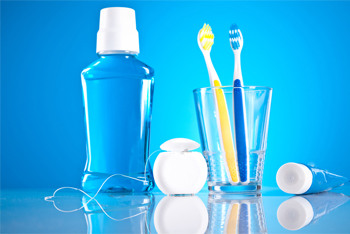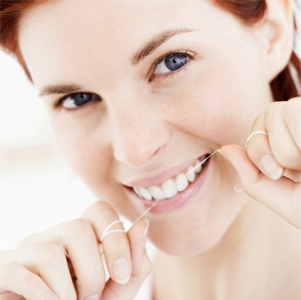DENTAL CARE ROUTINE (MAINTAINING YOUR ORAL HYGIENE)
Flossing once a day; keeps the drill away!

Dental care routine comprises of not only brushing your teeth. It encompasses flossing between your teeth and the regular use of mouthwash to prevent further tooth decay as well.
BRUSHING YOUR TEETH

Brushing your teeth is an important part of your dental care routine. For a healthy mouth and smile we recommend you:
- Brush your teeth twice a day with a soft-bristled brush. The size and shape of your brush should fit your mouth allowing you to reach all areas easily.
- Replace your toothbrush every three or four months, or sooner if the bristles are frayed. A worn toothbrush won’t do a good job of cleaning your teeth.
- Make sure to use a fluoridated toothpaste.
- Porcelain Laminate Veneers
- Extraction and replacement by Implant or Bridge
Brushing Technique: The proper way is to:
- Place your toothbrush at a 45-degree angle to the gums.
- Gently move the brush back and forth in short (tooth-wide) strokes.
- Brush the outer surfaces, the inner surfaces, and the chewing surfaces of the teeth.
- To clean the inside surfaces of the front teeth, tilt the brush vertically and make several up-and-down strokes.
- Brush your tongue to remove bacteria and keep your breath fresh.
Back to top
FLOSSING

Flossing is an essential part of taking care of your teeth and gums. We recommend flossing at least once a day to help remove plaque from the areas between your teeth where your toothbrush can't reach. This is important because plaque that is not removed by brushing and flossing can eventually harden into calculus or tartar. Flossing also helps prevent gum disease and cavities.
The most important thing about flossing is to do it. As long as you do a thorough job, it doesn’t matter when. Pick a time of day when you can devote an extra couple of minutes to your dental care. People who are too tired at the end of the day may benefit from flossing first thing in the morning or flossing after lunch. Others might like to go to bed with a clean mouth.
And don’t forget, children need to floss too! You should be flossing your child’s teeth as soon as he or she has two teeth that touch. Because flossing demands more manual dexterity than very young children have, children are not usually able to floss well by themselves until they are age 10 or 11.
Keep in mind that flossing should not be painful. If you floss too hard, you could damage the tissue between your teeth. If you’re too gentle, you might not be getting the food out. It’s normal to feel some discomfort when you first start flossing, but don’t give up. With daily brushing and flossing, that discomfort should ease within a week or two. If your pain persists, talk to us.
What Should I Use to Floss?
There are several options for cleaning between teeth. You might choose to use dental floss or another product specifically made for this purpose like a dental pick, pre-threaded flosser, tiny interdental brushes that reach between the teeth or water flosser. Ask how to use them properly to avoid injuring your gums. It could be that you simply need to try another type of dental floss - waxed, unwaxed, thick or comfort floss. Stick with it and you’ll have adopted a healthy habit for life.
Back to top
MOUTHWASH

Mouthwashes are used for a variety of reasons; to freshen breath, help prevent or control tooth decay, reduce plaque (a thin film of bacteria that forms on teeth), prevent or reduce gingivitis (an early stage of gum disease), reduce the speed that tartar (hardened plaque) forms on the teeth or to produce a combination of these effects.
Most mouthwashes are available without a prescription. We can advise you whether you need a mouthwash and what kind of mouthwash to use depending on your oral health needs.
There are broadly two types of mouthwashes:
- Therapeutic mouthwashes: These can help reduce plaque, gingivitis, cavities, and bad breath. Those that contain fluoride help prevent or reduce tooth decay.
- Cosmetic mouthwashes: These may temporarily control or reduce bad breath and leave the mouth with a pleasant taste, but don’t deal with the causes of bad breath, kill the bacteria that cause bad breath; or help reduce plaque, gingivitis or cavities.
If you have difficulty brushing and flossing, a mouthwash may provide additional protection against cavities and gum disease. Speak with us; let us clear your doubts and help you know more about this procedure!!!
What Should I Use to Floss?
There are several options for cleaning between teeth. You might choose to use dental floss or another product specifically made for this purpose like a dental pick, pre-threaded flosser, tiny interdental brushes that reach between the teeth or water flosser. Ask how to use them properly to avoid injuring your gums. It could be that you simply need to try another type of dental floss - waxed, unwaxed, thick or comfort floss. Stick with it and you’ll have adopted a healthy habit for life.
Back to top

